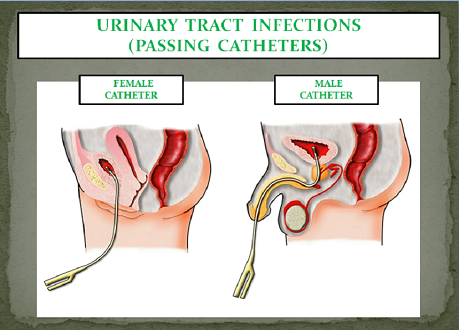UTIs, or urinary tract infections, are a common occurrence among females. However, a lingering question remains regarding the potential role of male sperm in causing UTIs. Does the introduction of male sperm during sexual intercourse increase the risk of developing a UTI? Let's delve into this topic to gain a better understanding of the connection between male sperm and UTIs in females.

To begin with, it's important to note that UTIs are primarily caused by the introduction of bacteria into the urinary tract. The urethra, which is the tube responsible for carrying urine from the bladder to outside the body, is the main point of entry for bacteria. Normally, the female reproductive system has several mechanisms in place to prevent the ascent of bacteria through the urethra. However, sexual intercourse can potentially disrupt this natural defense mechanism and facilitate the introduction of bacteria.
Sexual activities involving ejaculations, such as vaginal intercourse or oral sex, can introduce bacteria present in male sperm into the female urethra. This can significantly increase the risk of developing a UTI. The bacteria can then travel up into the bladder, causing discomfort, pain, and other UTI symptoms.
Prevention is crucial when it comes to UTIs related to male sperm. Here are few preventive measures that can help minimize the risk:
1. Urinating before and after sexual intercourse can help flush out any potential bacteria introduced during sexual activity.
2. Maintaining good hygiene before and after sexual activity can help minimize bacterial transfer.
3. Avoiding the use of harsh chemicals or irritants in the genital area, as they can disrupt the natural balance of bacteria and increase susceptibility to UTIs.
4. Using barrier methods of contraception, such as condoms, can provide an additional layer of protection against bacterial transfer.
If an individual experiences symptoms of a UTI after sexual activity, prompt medical attention is essential. A healthcare professional can diagnose the infection through urine tests and prescribe appropriate antibiotic treatment.
In summary, while male sperm itself does not directly cause UTIs, sexual activity involving ejaculations can introduce bacteria present in male sperm into the female urethra, increasing the risk of developing a UTI. Practicing proper hygiene, utilizing barrier methods of contraception, and seeking prompt medical attention when needed can help prevent and manage UTIs related to male sperm.
Related FAQs about can male sperm cause uti in females
Can male sperm cause UTIs in females?
Although male sperm itself does not directly cause UTIs, sexual activity involving ejaculations can introduce bacteria present in male sperm into the female urethra, increasing the risk of developing a UTI.
How does the introduction of male sperm during sexual intercourse increase the risk of UTIs?
The introduction of male sperm during sexual intercourse can disrupt the natural defense mechanisms in the female urethra, facilitating the entry of bacteria and increasing the risk of developing a UTI.
What can be done to prevent UTIs related to male sperm?
Preventive measures include urinating before and after sexual intercourse, maintaining good hygiene, avoiding harsh chemicals or irritants in the genital area, and using barrier methods of contraception, such as condoms.
What are the symptoms of a UTI related to male sperm?
Common symptoms include a burning sensation during urination, frequent urination, cloudy or strong-smelling urine, pelvic pain, and a feeling of urgency to urinate.
What should I do if I suspect a UTI related to male sperm?
If you experience symptoms of a UTI after sexual activity, it is important to seek medical attention promptly. A healthcare professional can provide an accurate diagnosis through urine tests and prescribe appropriate antibiotic treatment.
Glossary about can male sperm cause uti in females
1. UTIs: UTIs, or urinary tract infections, are infections that occur in any part of the urinary system, which includes the kidneys, bladder, ureters, and urethra. They are primarily caused by bacteria entering the urinary tract.
2. Urethra: The urethra is a tube that carries urine from the bladder to outside the body. In females, it is shorter compared to males, making it easier for bacteria to reach the bladder and cause infections.
3. Bacteria: Bacteria are microscopic organisms that can cause various diseases and infections. In the context of UTIs, bacteria can enter the urinary tract through sexual intercourse and lead to infection.
4. Bladder: The bladder is a hollow organ located in the lower abdomen that stores urine. Bacteria entering the bladder can cause inflammation and infection, resulting in the symptoms of a UTI.
5. Symptoms: Symptoms of a UTI may include frequent urination, a burning sensation during urination, cloudy or bloody urine, pain or pressure in the lower abdomen, and a strong urge to urinate even when the bladder is empty.
6. Hygiene: Hygiene refers to practices that promote cleanliness and health. Maintaining good hygiene before and after sexual activity can help reduce the risk of bacterial transfer and UTIs.
7. Contraception: Contraception refers to methods used to prevent pregnancy. Barrier methods of contraception, like condoms, create a physical barrier that can help prevent the transfer of bacteria and reduce the risk of UTIs.
8. Antibiotic treatment: Antibiotic treatment involves the use of medications that can kill or inhibit the growth of bacteria. When diagnosed with a UTI, a healthcare professional may prescribe antibiotics to treat the infection.
9. Medical attention: Medical attention refers to seeking advice or care from a healthcare professional. If experiencing symptoms of a UTI, it is important to get prompt medical attention for diagnosis and appropriate treatment.
10. Practicing: Practicing refers to engaging in a regular activity or adopting specific habits. In the context of UTI prevention, practicing good hygiene and using barrier methods of contraception can help reduce the risk of infection.
